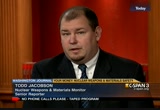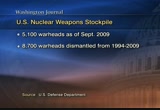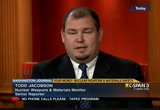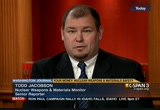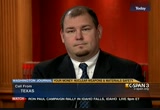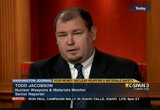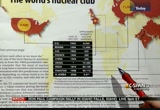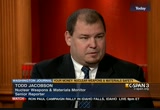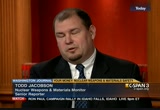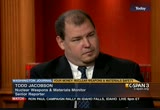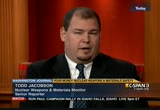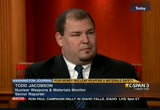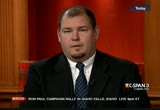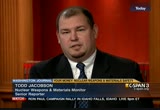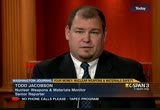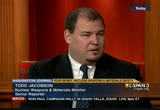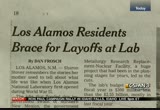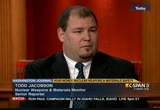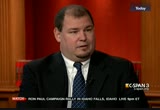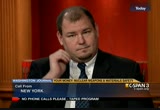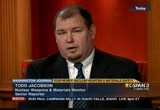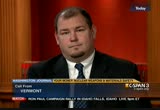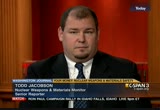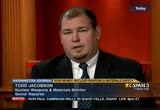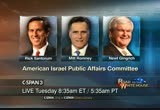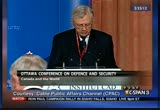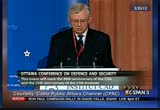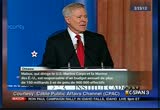tv [untitled] March 5, 2012 8:00pm-8:30pm EST
8:00 pm
should be spending money on the nucle nuclear stockpile. on the other side of the coin, people think we're spending too much. in 2010, the administration revealed for first time in decades the size of the stockpile. it's 5,000 war heads and there are a lot of folks in congress who think that's too much. it is more costly to maintain as i mentioned earlier. so there's folks in congress like ed markey who think, you know, we don't need to be spending billions of dollars on infrastructure projects. that's, you know, a big part of this whole debate, you know, as part of the new s.t.a.r.t. treaty signed in 2010, part of the debate on that was, you know, what we're doing with our current stockpile and how much we're modernizing it. so to get that treaty through, there was a large commitment made. $88 billion over the next ten years. to build some new facilities, some -- to replace older facilities that were kind of cold war era facilities.
8:01 pm
some people think that's too much. that we're spending too much on that. we could have a smaller stockpile. that could kind of secure -- that could secure our nation just as well what we have now. that's kind of the push and the pull in congress over, you know, these issues. >> jim writes on btwitter, we must rid the world of all nuclear weapons. this number of 2009 was over 5,100 war heads and then the number of war heads dismantled from 1994 to 2009 was 8,700 war heads. >> yes, that's correct. there's about 2,500 to 3,000 more to be dismantled. it's a difficult thing to do. the national nuclear security administration which is what i cover, they just completed the dismantlement last year of one of the cold war vestiges, you know, one of those weapons that
8:02 pm
doesn't have a use in the current stockpile. it was the b-53 and it was the size of a minivan or even bigger. it was probably one of the most powerful weapons we ever had. there's really no strategic reason for us to have it now. part of what the nnsa does is dismantles the weapon. it's a difficult thing when talking about dismantling the size of a minivan, with plutonium and uranium and, you know, high explosives attached to all of that. you don't take screwdrivers out and take it apart it's a methodical process that they do. i'm sure you can imagine just moving something like that, is really difficult. so they had -- you know, they had to develop special tools, special hoists and cranes to kind of do that. so that's -- you know, part and parcel of what the nnsa does is they maintain, and they dismantle stuff we don't need. it happens at the same plant in texas. they do the modernization
8:03 pm
efforts. they do kind of the surveillance and they also, you know, take apart the war heads that we don't need anymore. >> i read a tweet a moment ago by jim who wanted to get rid of all nukes. he's a different jim saying the genie is out of the bottle. if doing away with the nukes only makes us vulnerable to nuke terrorism. so we're basically leaving ourselves vulnerable. >> yeah, i mean, i don't think anyone says we should get rid of all the nuclear weapons tomorrow. you know, down the road, you know, people see that as a potential hurdles. there's a lot of dissenting opinions on that. there are people who disagree with the president on his vision. it's got to be a slow, methodical process. i think most people recognize that. that for the meantime we can't just say we're done with these -- the genie is out of the bottle in a sense. we have to kind of along with the international community take things, you know, down a slow
8:04 pm
path. that means kind of having treaties with russia. like the one we had. the new s.t.a.r.t. treaty in 2010. bringing in france and china and the u.k. into the arms control. >> a republican from texas. welcome. >> caller: good morning. and right now, iran is threatening us or they're threatening to build a nuclear weapon. we have iran surrounded right now. and we have what you just said over 5,000 nuclear weapons ourselves, plus we're the only country in the world that drops nuclear weapons. what gives us the right to tell any country what they can build a nuclear weapon or not when we've already dropped one? >> well, i think your point is well taken, but, you know, i would go back to the nuclear nonproliferation treaty which
8:05 pm
was signed decades ago which basically was an agreement among all countries that, you know, nuclear weapons are kind of a genie that's out of the bottle. we need to kind of stop it. i mean, the nuclear nonproliferation treaty was signed when there was a fear that, you know, at the time there was a handful of countries that had nuclear weapons. there was a fear then that decades from the '70s that there would be 20, 30 countries from nuclear weapons. so at that time there was an agreement that said, you know, these countries that have them they're going to move to get rid of them eventually. other countries can't develop them. but at the same time, you know, if you wanted to develop nuclear technology for nuclear energy you can do that. so i think most people would agree that the security of the world would not be enhanced if every country had a nuclear weapon. because you get into some difficult issues with securing them and i think you had mentioned terrorism.
8:06 pm
i mean, that's a real concern. you know, countries that have nuclear weapons are they securing them enough and can they do that? because it's a fear of a lot of people that a terrorist can get ahold of an unsecured nuclear weapon or material and do something bad with it on our soil. >> let's look at this. we talked about the number of nuclear war heads in the united states, over 8,500. looking a at the world nuclear club, who around the world has nuclear weapons? >> russia, 11,000. approximate number. united kingdom, over 200. france over 300. china, over 240. then israel between 75 and 2 hundred. india between 80 and 100. and north korea, five to six with this asterisk. that's the estimate based on the weapons grade plutonium korea is believed to possess.
8:07 pm
>> yeah. the whole point of the arms control regime out there is to get a handle on that -- those it haves and kind of stop and stem, you know, the nuclear club from expanding. that's why there's such a high level focus on iran. if iran was to get a nuclear weapon, you can see the dominos falling in the rest of the middle east as others pursue it. you saw syria a couple of years ago, they were clandestinely pursuing a nuclear weapon as well. it was a real concern to keep that number lower. right now, when we're talking articles control, arms control negotiations it is really u.s. and russia. but as the numbers come down as the stockpiles creep closer to china, creep closer to france and the u.k., eventually you'll see -- you have to see multilateral arms control negotiations. >> redwood city, greg on the independent line joins the conversation. good morning. >> caller: good morning. i just wanted to point out that you said that israel has -- i
8:08 pm
don't know if you said over 400 -- or 75 nuclear weapons. how come they don't make that a point when talking about the middle east and iran? if israel has -- i don't think it's declared. why don't we send the nuclear inspectors to go inspect their stock and then show that, you know, we're doing something proactive, that we're showing the iranians, hey, it's not only you and then go to iran. why is that not done? >> that's not really in the direct kind of line of what i cover. but, yeah, you're right. israel is not a declared nuclear weapons state. it's widely assumed that they have nuclear weapons but yeah, that's not something that's in the direct kind of lane of what i do. so it's kind of hard for me to answer why the u.s. doesn't have a policy of going into one of its allies and kind of inspecting its nuclear weapons. >> todd jacobson is a senior reporter at nuclear weapons and
8:09 pm
monitor. we're talking about the nnsa. that's the national nuclear safety administration. it's charged with maintaining the nation's nuclear deterrents capability, securing vulnerable materials and the president has requested a budget for fiscal year 2013 of over $11 billion for the nnsa. the national academy of sciences has a report saying that the nnsa security of sites such as lawrence livermore is affecting the work of the labs. talk to us about security. >> security of -- specifically you're referring to in terms of security? >> it says -- here's one that says put a little trust in nuclear lab, maintenance of nuclear weapons stockpiles z is the core mission, but according to the national research council last month, lab employees say contracting oversight, and capital strains have diluted the primary goal and are putting
8:10 pm
research at risk. >> yeah. the real issue is, you know, how much nnsa -- how much oversight is on the labs. several years ago, the congress forced the nnsa to compete the contracts for those labs. >> so they're privately managed? >> yeah, they're privately managed. at the time they're managed by the university of california. they had been managed like that for decades. in the early 2000s, congress moved to force them to compete for the many times in decades. there are other department of energy labs they have done at the same time. both of those labs are now run by teams consisting of beck tell and other partners. when they talk about trust in the article, they would like the nnsa to do less of telling them what to do, you know, i guess it's the whole -- what they want is more freedom.
8:11 pm
i guess to explore the scientific issues that they think they need to be explored without, you know, the nnsa telling them every step they need to take. so what they say is those administrative burdens are really hampering the amount of work they can do. i think one of the examples in the report is a scientist at one of the labs needed five signatures, needed to write a position paper to just, you know, go on -- go to a conference. so much of the scientists complained that all of their work, all their time is being taken up by red tape. so there's the debate as to where the sweet spot is. so the money we spend on our weapons doesn't just go to kind of filling out forms. you know, there's one take on it, at least. >> donna democratic caller in baltimore. good morning. >> caller: hi. in response your earlier caller, i'd like to say it was almost right after president obama cut
8:12 pm
the military budget i think like $38 billion and the following week gave $31 billion yesterday, i believe, at the israeli conference with benjamin netanyahu, gave them $31 billion for their defense. it just seems redundant. also, my main -- my first question was are they working on like everything is getting smaller, computer, everything, are they working on like tiny nuclear that could be on drones and things like that? >> no, i don't think that nuclear weapons would ever be on a drone. i mean, the debate right now is whether we keep all three legs of the nuclear triad which is the airborne leg which is the bombers that we have that are equipped to carry the nuclear weapons and the sea planes that carry submarine launched ballistic missiles.
8:13 pm
then the icbms that we have around the country. so i don't think there's any possibility of ever having drones that would carry, you know, nuclear weapons. >> a couple of folks writing in. is yucca mountain disposal site operational? >> no, it's not operational and not within the budget of the national nuclear security administration. but i'm sure whoever wrote that question there's a big debate about what to do with yucca mountain. around the country, this isn't something i cover directly but something you can't avoid it. around the country we have got tons of nuclear waste from the commercial nuclear agency that's sitting at various sites. we need to find a disposal path. that's the debate over yucca mountain. the place for years, you know, we thought we'd put it. obviously the obama administration reversed course. got a lot of republicans especially in the house that are pressing for reversal of that decision. it's in the courts right now. so we'll see that sorts out.
8:14 pm
>> yucca mountain is outside the jurisdiction of the nnsa. >> yeah, it is. nnsa is not into the disposal of commercial nuclear waste or anything like that. it's really -- the agency i cover is really about how do we maintain the stockpile that we have? there's eight sites around the country that are tasked with that. and then it's kind of the other mission of, you know, securing nuclear material around the world, making sure that it's safe, you know. that's been a big agenda of the obama administration as well. a lot of funding goes overseas to make sure things are safe overseas. >> you mentioned a lot of this is classified so you're report on a topic that's challenging for a reporter to delve into. have you gone out to the sites, have you seen the teams in action? >> yeah, i have been to five of the eight sites so far. i have been doing this for a
8:15 pm
couple of years. i have been to lawrence livemore national laboratory and to los alam alamos. there's certain things i can see and can't see. i wouldn't want to be put in the it situation of seeing something that i wasn't able to report on either. i wasn't able to see them going to build pits. they are right now -- you know, they call it the plutonium center of excellence and they're in charge of building the pits. they only do a handful of them. i think the most they have done is 11 which is a far cry from how many they would do in the cold war. you know, that's a totally different plant that would do them in colorado. when i went to los alamos, i was able to tour some of the other things that they do. some of the nonproliferation angles. some of the, you know, some of the construction they're planning. so i actually took a tour of one of the facilities that was supposed to be one of the
8:16 pm
pillars of the whole modernsatimoderer modernization issue. and then -- at the nnsa it's kind of a mouthful to say, but at the time it was a hole in the ground and still a hole in the ground because they have put it on hold now. kind of reassessed whether it was needed. i was able to see things like that. going to the sides, meeting the people, talking to the officials thve on what they do out there. as a reporter it's great. even though i can't -- they're not going to give me a pit or anything like that. >> los alamos residents brace for layoffs at the lab. and it takes about the role that the los alamos laboratory has played in new mexico. it's helped give birth to the manhattan project and last month the obama administration decided tofe construction of the new plutonium research facility for at least five years because of
8:17 pm
budget constraints. they needed to lay up to 11% of the 7,600 employees. >> yeah, it's a huge issue. they deferred the cmrr-nf that's what it's called. and los alamos is an economic engine in northern new mexico. it's huge issue in the community because it's an isolated area. i mean, pretty much everyone that lives in the town has something to do with the lab. whether it's, you know, people that sell food to the people that work at the lab. so it's really almost a crisis for them up there because their budget was cut in fy-2012, and their budget was cut by 200 to $300 million. they have had to do a lot of scrambling, and figure out how to meet the mission. like i mentioned the pits at los alamos earlier. without that facility, and without, you know, the budget that they need, they're not going to be able to meet the requirements that the administration and the military eventually wants them to make. there's a lot of hard decisions
8:18 pm
and a lot of assessing and res a sellsing that's going on right now. in terms of how they -- what their path forward is. so they're looking at potentially 400 to 800 cuts. they want to do it without, you know, forced layoffs. you know, they're taking applications right now. i think it's through april 5. >> for buyouts? >> yeah. for buyouts. in 2008 they were able to avoid having actual layoffs so hopefully they'll be able to do that again. because at the sister laboratory in liveermore, california, in 2008 they had a voluntary separation program, didn't get enough, and they had to force people to be laid off. it has been an incredibly difficult process. and there's a lawsuit and people who feel that they were age discriminated against. so whenever you have to force
8:19 pm
people to leave an institution like that, people that worked there or the 20 or 30 years it creates a huge issue for morale even for the people who are still there. livermore is till trying to recover from it. >> caller: first, i want to preface by what i want to say i'm an independent. so i kind of deal in the real world and not the sides that you hear all the people crying. for one thing, the reality of it is, if so many -- 200 or 300 of these go off, does anybody want to really live on the earth? will we be inhabitable? why have 30,000 or whatever? the other second point is it's a deterrent and this is what people don't understand, iran wants to get one because then they know you have to be dealt
8:20 pm
with. if you've got a nuclear weapon you're on the equal playing in terms of diplomacy. you have to actually respect your enemy if they have it. >> yeah, to answer your first question, i don't think anyone believes that we really have to have a stockpile in the tens of thousands. i mean, that's why we're on a gentle slope towards lowering it. that's the opinion of the administration and kind of the direction that everyone is heading. there's a current study going on at the pentagon and as a follow on to the new s.t.a.r.t. treaty as to where we can go next. there's a debate as if we should go lower which capped the strategic stockpile at 1,050 war heads. some people say we should go lower. a couple of weeks ago, one of -- jim miller who's a pentagon official said he believes that, you know, we could maintain our security with potentially smaller numbers. so that's the direction that
8:21 pm
they're going. there's a lot of republicans who feel we need to put the brakes on. make sure that we're modernizing and there's a tremendous debate going on in congress about what's the right path forward and some of the budget cutbacks have not helped the administration's case recently. >> glenn, democratic caller, bennington, vermont. good morning. >> caller: good morning. how are you? thank you for taking my call. >> please go ahead. >> caller: todd, i was wondering what your knowledge is on broken arrow incidents and what current effort on the part of the dod is to monitor those sites and possibly recover any material that might still be in the ground or in swamps off georgia. >> i mean, that is a dod effort. not something that the national nuclear safety administration
8:22 pm
does and i focus on the sites that currently maintain our weapons and the weapons complex that we have. so the broken arrow stuff is not within my direct -- >> can you explain what it is? >> well, what he's referring to is when a nuclear wear head get in an accident. it's happened unfortunately over the last 50 or 60 years. where, you know, there's been airplanes that have had nuclear weapons on them that have crashed. there's sites around the country where it's happened. it's my understanding that the dod is in charge of monitoring those and the effort was made, you know, when it happened to kind of clean up and make su sure -- no time did it ever happen that a nuclear war head detonated and there was an explosion because of one of those. when a war head does crash to the ground, radiation and radioactive material is disbursed. i know that's something that the dod takes seriously.
8:23 pm
>> and marilyn writes about using thorium as a nuclear power. do you know about that? >> well, i know the department of energy is exploring all avenues for nuclear power. the obama administration said it's behind nuclear power. thorium is in the whole range of options they're looking at. i know small modular reactors are a big deal and i know there's a push to develop those. so that's not really in my direct line of what i cover though. >> thanks for taking i would on. todd jacobson, a senior reporter at nuclear weapons and nuclears monitor. it's exchangemonitor.com. thank you for being here this morning. on washington journal tomorrow morning, the president of the roundtable looks ahead to president obama's speech to the
8:24 pm
top ceo's. huffington post reporter tom zoeller looks at the poor and middle class. and andrew weiss will talk how the election of vladimir putin will affect relations between the u.s. and russia. washington journal is live on c-span every day at 7:00 a.m. eastern. tomorrow our live coverage of the american/israel public affairs annual conference continues. speakers include rick santorum, mitt romney and newt gingrich. live coverage starting at 8:35 a.m. eastern here on c-span 3. this crazy world of ours, we have atom bombs. the question is not how to use them. the question is how do you restrain yourself from using them? that's particularly when your commander in chief, any fool can
8:25 pm
get this country in trouble. it takes a wise man to get it out. >> as candidates campaign for president this year, we look back at 14 men who ran for the office and lost. go to our website to see video of the contenteders who had ain impact. >> shouldn't your president be an example to the children and young people in this country? ask yourself that question, please. shouldn't his life make him a role model for your future children? shouldn't anyone you elect to this office always keep his promises? >> c-span.org/the contenders. u.s. navy secretary ray mabus talked about the role of the u.s. military and coalition partners at the 2012 ottawa conference on defense an security. his remarks are about 40 minutes and come to us courtesy of canada's public affairs channel,
8:26 pm
cp cpac. >> the honorable ray mabus, u.s. secretary of the navy. ray mabus is the 75th u.s. secretary of the navy. he leads america's navy and marine corps and is responsible for an annual budget in excess of $150 billion. and almost 900,000 persons. you have copies of his curriculum vitae, his biography in your packages. allow me to make a few remarks about his background. prior to joining the administration of president barack obama, mr. mabus served in a variety of top posts and the private sector. he was elected as the youngest governor of mississippi at the age of 39. p in more than 100 years at the time of his election, and previously as state auditor 1984 to 1988, and was instrumental in
8:27 pm
rooting out huge corruption and misappropriation of public funds in county government in 25 counties. he was also appointed to the kingdom of saudi arabia by the clinton administration. let me end the introduction of our splendid speaker by suggesting too he's served two year, '70 to '72 on cruiser little rock. and he was offered a fulbright scholarship. ladies and gentlemen, please join me in well coming to the podium, the honorable mr. mabus. >> mr. chairman, thank you so much for that wonderful introduction. i appreciate the hospitality here in ottawa.
8:28 pm
you're far more hospitable to me than your senators were to the capitals. although, the capitals have evidently -- i don't know how many of you saw the game or went to the game, but they have perfected the puck off the face into the net. it's really hard to plan to play. i'm very honored to be here with you. i'd like to speak a few minutes and then take whatever questions you have. the united states and canada are allies, friends, neighbors. our trade and military partnerships are as strong and enduring as our border is long. and the connection between our
8:29 pm
two countries is far more than geographical. it encompasses the values and the security. our defense ties were established in a pretty informal setting. august 18, 1940. 60 miles or so south of here when prime minister mckinsey king and president franklin roosevelt sat in roosevelt's car in new york. and agreed in principle to what became known as the ogdensburg agreement. it was a simple five sentence document established the permanent joint border defense. focused on the defense of the north half of the western he hemisphere. it said the first meeting of the board would happen and i quote, shortly.
133 Views
IN COLLECTIONS
CSPAN3 Television Archive
Television Archive  Television Archive News Search Service
Television Archive News Search Service 
Uploaded by TV Archive on

 Live Music Archive
Live Music Archive Librivox Free Audio
Librivox Free Audio Metropolitan Museum
Metropolitan Museum Cleveland Museum of Art
Cleveland Museum of Art Internet Arcade
Internet Arcade Console Living Room
Console Living Room Books to Borrow
Books to Borrow Open Library
Open Library TV News
TV News Understanding 9/11
Understanding 9/11